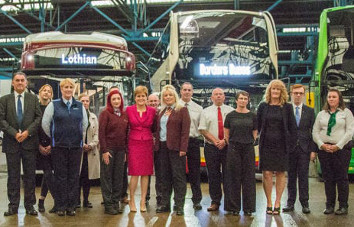Scotland’s first minister has set out plans for an ‘embryonic Scottish Green Deal’ including £500m for bus priority infrastructure and a target to achieve zero emissions on the country’s railways by 2035.
Nicola Sturgeon was presenting her government's Programme for Scotland 2019-2020.
She said: ‘The consequences of global climate change will be severe. While in some parts of the world its effects are existential, we will also feel the impact here at home. We must act.

Nicola Sturgeon at Lothian Buses' Central Garage
‘This Programme for Government sets out some of the next steps on Scotland's journey to net zero emissions and raises our ambition in light of the emergency we face. We are leading the world in setting challenging targets, but we must also redouble our efforts to meet them.’
In addition to a number of ‘fundamental reviews of government activity’ such as its new National Transport Strategy, she announced ‘the first package of additional measures that we will take in response to the climate emergency’.
She described this as an ‘embryonic Scottish Green Deal’, which includes commitments to:
- invest over £500m in improved bus priority infrastructure to tackle the impacts of congestion on bus services and raise bus usage
- put the Highlands and Islands on a path to becoming the world's first net zero aviation region by 2040, including a commitment to zero emissions from Highland and Islands Airports Limited's operations. Trials of low or zero emission flights will begin in 2021
- reduce emissions from Scotland's railways to zero by 2035 through the continued electrification of the network, the procurement of battery-powered trains and exploring the potential of hydrogen powered trains in Scotland
- 'unlock' additional resource for emissions-reducing investment through a Green Growth Accelerator – referred to by the Climate Emergency Response Group (CERG) as a 'Green City Deal' – combining public and private investment to transform cities and regions
- provide an additional £17m to support the demand for ultra-low emission vehicles (ULEVs) through the Low Carbon Transport Loan scheme, while expanding the scheme to include used electric vehicles
- bring to market a £3bn portfolio of projects, including renewables, waste and construction, ready for green finance investment
Richard Hall, managing director, Lothian Buses, said: 'As an industry we have always demonstrated that bus travel creates modal shift and encourages active travel journeys whilst delivering long term health, environmental and economic benefits.
'However the impacts of ever increasing congestion must now be dealt with to ensure that bus can deliver against this positive announcement today from Scottish Government. This will give the opportunity of additional investment to enhance measures already being implemented by operators to encourage active travel and modal shift.'
Register now for full access
Register just once to get unrestricted, real-time coverage of the issues and challenges facing UK transport and highways engineers.
Full website content includes the latest news, exclusive commentary from leading industry figures and detailed topical analysis of the highways, transportation, environment and place-shaping sectors.
Use the link below to register your details for full, free access.
Already a registered? Login